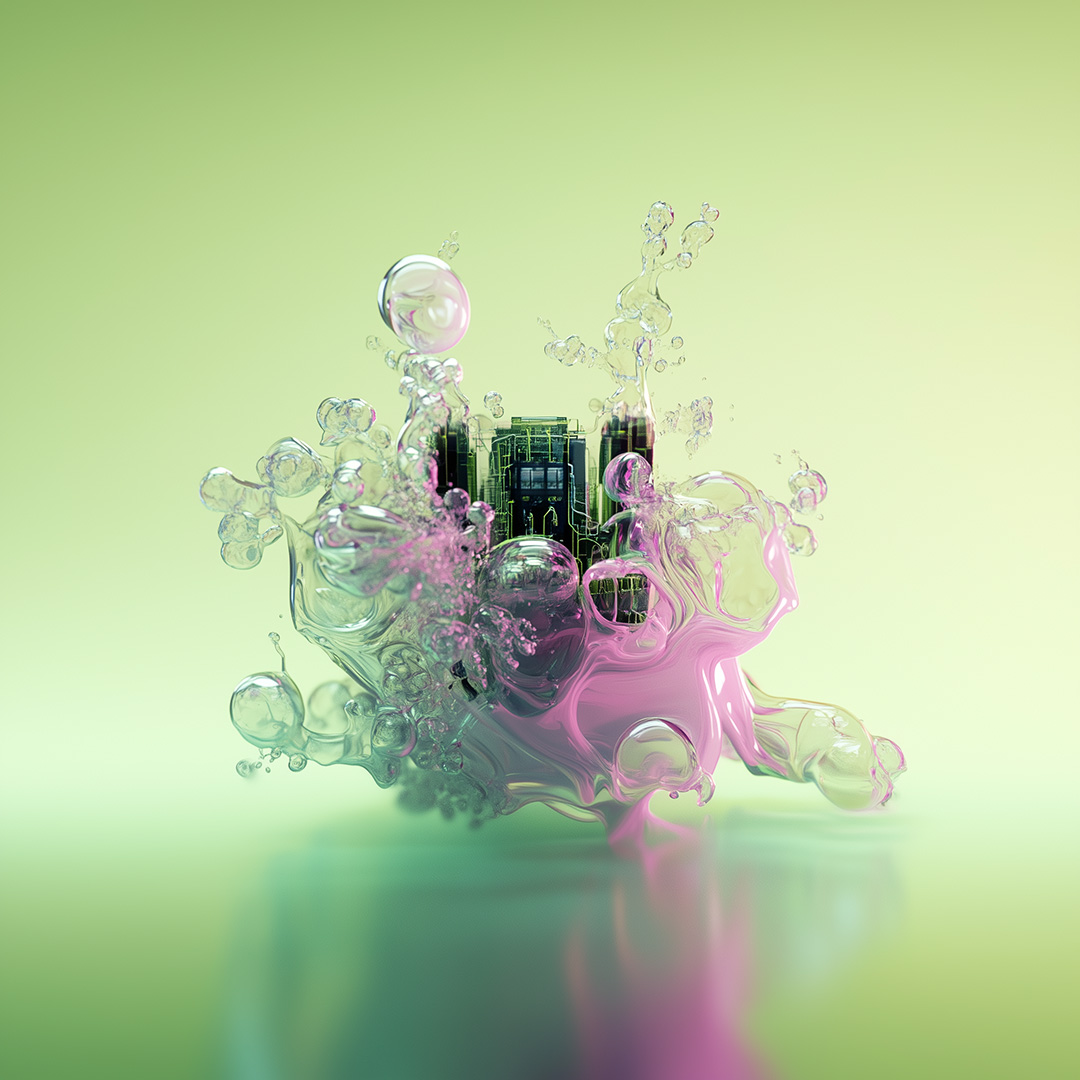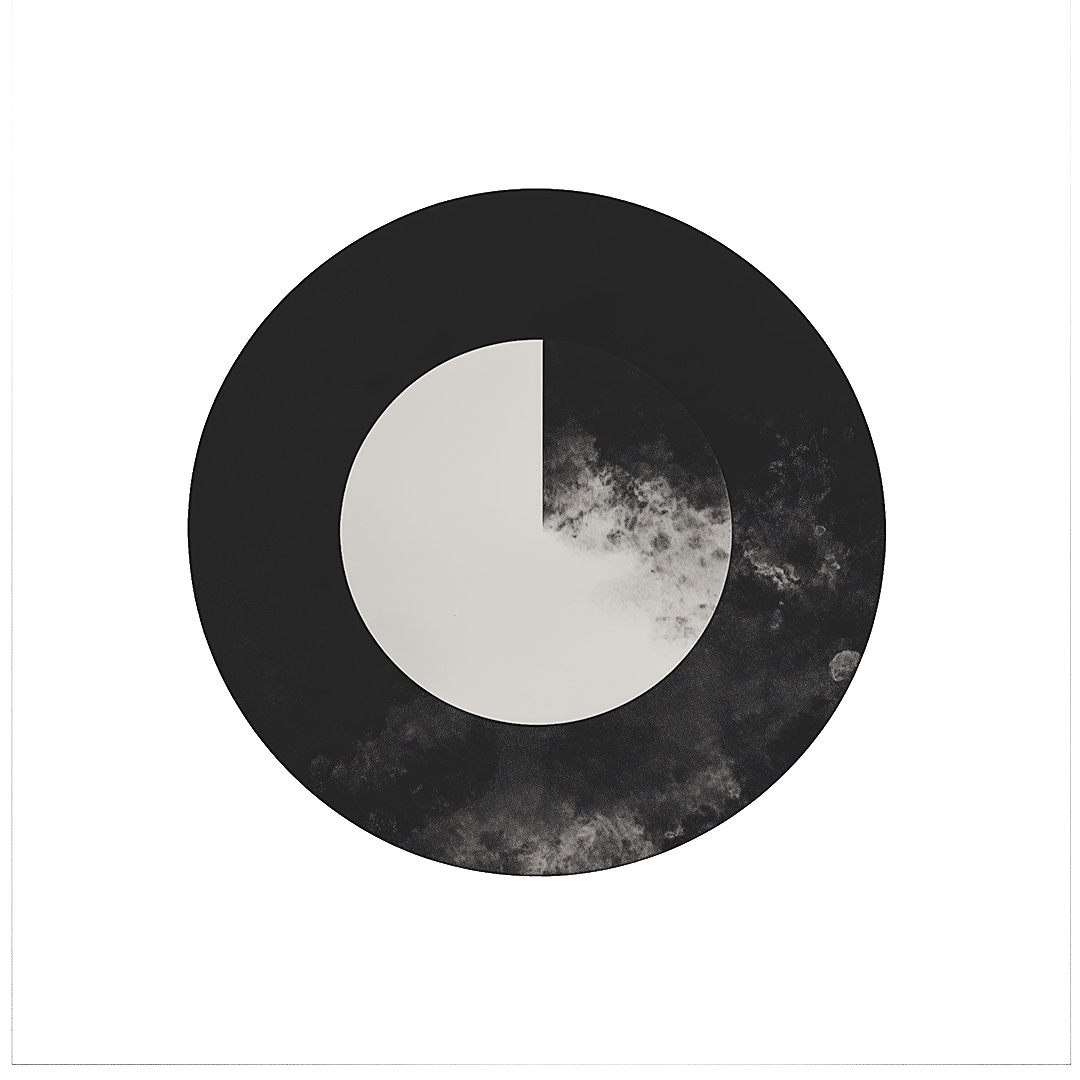OPENINGS

02LIQUID MACHINE: QUANTUM PHENOMENA
@ Cerchio 91
Special guests: Alessandro Chiolerio, Oliver Rasmus
17 January 2025
Generative Center
Cerchio 91 Via Besso 42 a,
6900, Lugano Besso
Switzerland
ROUND TABLE: AI - New Dimensions
Let’s start the year with a dialogue: what is artificial intelligence? How is it transforming our world? What is its deeper meaning? What is it for you?
Stimulus: an exploration of the multifaceted role of water as a source of life, intelligence, and memory, and the connections between nature, technology, and the intricate quantum fabric of reality.
"The universe is not only stranger than we imagine, it is stranger than we can imagine. This applies to the interplay between quantum processes and the emergence of conscious experience."
Roger Penrose, The Road to Reality
STOP PINK! BOOK PRESENTATION
“Stop Pink!” is a book of images generated with AI models structured around scenes inspired by nature, technology, our evolution and society in general. The idea is to talk about us and the world around us, through short stories, sometimes surreal, sometimes not, sometimes deliberately exaggerated and symbolic, sometimes poetic or dreamlike.
Oliver Rasmus Schneebeli is a Swiss graphic designer and illustrator, born in 1969 in Lugano. After studying graphic design and illustration at the Ecole Supérieure des Arts Appliqués de Lugano (ESAA), then sociology of communication at the University of Lausanne (UNIL), he became a freelance graphic designer in 1999, within the Strates photographers collective, in Lausanne. He has produced several books and magazines for photography, posters in the cultural and social fields, websites and journals, logos and coordinated corporate images. His passion for images, photography and drawing naturally led him to take an interest in algorithmic image generation systems in 2023. He created several thematic series of images before launching the project «The Pink Series» in early 2024 and «The Black Series» in October of the same year.
From the book’s introduction:
“But can we call “work” what results from a “prompt” fed to a machine? The question, in fact, does not concern the machine. A photographic camera has no more genius than a computer. If there is genius, it is indeed to the living being, of flesh and blood, who manipulates the machine, that it will eventually have to be attributed. If AI technology is new, we can therefore see that the “artistic” questions that arise regarding the images it is capable of producing are not. Thus, it is human nature that we must once again trust, because it is she alone who will know, to quote Baudelaire’s verse, how to plunge us «to the bottom of the abyss, Hell or Heaven, what does it matter? To the bottom of the Unknown to find something new!!”
Christophe Fovanna
CONFERENCE: QUANTUM EXPERIMENT BY ALESSANDRO CHIOLERIO
Abstract
Water has been the fundamental component of all living beings that have emerged on this planet. It governs and supports atmospheric phenomena, balances the mineral, plant, and animal worlds, and preserves the matrix of life across all cultures, both living and extinct. Can we deepen our understanding of its significance even further?
Water has been the fundamental component of all living beings that have emerged on this planet. It governs and supports atmospheric phenomena, balances the mineral, plant, and animal worlds, and preserves the matrix of life across all cultures, both living and extinct. Can we deepen our understanding of its significance even further?
Scientific inquiry often seeks to simplify, isolating and reproducing phenomena under controlled, sterile conditions. Yet, such approaches risk losing the coherence of the ecosystems they aim to understand. Alessandro Chiolerio’s experiments at Paneveggio Forest in Val di Fiemme Italy, have provided for the emergence of intriguing correlations: by observing an “holobiont” in its natural environment, analyses have revealed the features of a collective being, potentially enabled by quantum phenomena.
The study of bioelectric signals—collected and analyzed as part of this research—provides a unique "listening" method that unveils unexpected behaviors. Over time, Plants and Fungi have developed intricate networks of both visible and invisible connections. Ultimately, these networks share a common denominator: water.
Recent experimental studies are uncovering the extraordinary possibilities of water-based computing systems. As the cornerstone of life and intelligence, water's ability to encode and transmit information challenges our understanding of its role in both biology and physics.
Alessandro Chiolerio's conference will feature a live quantum experiment, open to audience participation, demonstrating the world's first programmable liquid computer. By examining water through this multifaceted lens, the conference seeks to bridge the gap between science, nature, and technology, inspiring new paradigms in understanding intelligence and memory in the universe.
About Alessandro Chilerio
Currently bridging synthetic intelligence and biological intelligence, their suitability for building analog memories and reservoir computers, and the electrical communication channels between plants and fungi in a living forest on the other side, where computational entropy and divergence could highlight learning mechanisms. Chiolerio has). He is co-author of 150 scientific articles collecting over 6800 citations to date. Chiolerio has filed overall 34 patents as sole or principal inventor.
Key Contributions by Alessandro Chiolerio
Alessandro Chiolerio’s work exemplifies the convergence of biology, physics, and synthetic intelligence, contributing significantly to:
Alessandro Chiolerio’s work exemplifies the convergence of biology, physics, and synthetic intelligence, contributing significantly to:
- Bioelectric Communication: Demonstrating how plants and fungi form intricate networks that could be harnessed for computational purposes.
- Quantum Experimentation: Leading groundbreaking research on programmable liquid computers, pushing the boundaries of water-based computing systems.
- Holistic Ecosystem Studies: Exploring forests as collective bioelectric systems, offering a novel lens for understanding ecological intelligence.
- Interdisciplinary Innovation: Bridging synthetic and biological intelligence, aiming to create analog memory systems and new computational paradigms.
This body of work suggests a future where water, ecosystems, and quantum systems redefine our understanding of intelligence and memory.
